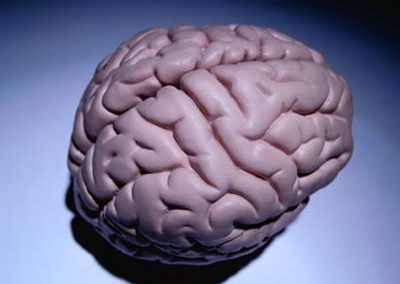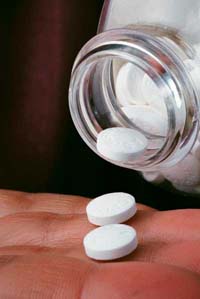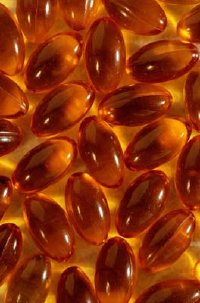How Folate Works (original) (raw)
Folate, also sometimes known as folic acid, helps form the genetic material DNA and RNA -- the blueprints for our bodies. As such, folate is vital to growth, which is why it's especially important for pregnant women. In this article you'll see how folate helps the body build cells and hear about some of the devastating diseases that can happen to a fetus without enough folate. Here's a quick preview:
Folacin, folic acid, and folate all refer to the same B vitamin, which occurs in foods in all three forms. The term folate covers all three, and the term folate activity describes the actual biological potency, or vitamin value, of a food. Folic acid is the simplest form of the vitamin. Vegetables are high in folate, and this page will tell you some other sources, too.
Folate has many benefits specific to women. In addition to helping create healthy fetuses, it also seems to prevent cervical cancer and can reduce osteoporosis. But it has benefits for both genders as well. Folate, like many vitamins and nutrients, helps combat heart disease. It also releases serotonin, which makes it act as a mild antidepressant. Learn about all of folate's uses on this page.
A lack of folate in unhealthy for anyone, but in fetuses it can cause very serious brain disorders. In extremely rare cases, babies have been born without a brain. That's why pregnant women and even women who are planning to conceive should consider a folate supplement. On this page you'll learn the symptoms of a folate deficiency.
Not everyone agrees on how much folate is the right amount to take. Although it seems like too much can never be enough for such a vital nutrient, there is a risk of folate masking a B12 deficiency, which can be just as problematic as a folate deficiency. On this page you'll learn the arguments on all sides of the folate debate.
Folate is just one of the many vitamins that are part of a healthy diet. Check out the following links to learn more:
- Vitamin B12, which helps folate make cells, works differently than any other vitamin. Learn the details at How Vitamin B12 Works.
- Vitamin A plays an essential role in eyesight. Learn how it helps us to see, even in the dark, at How Vitamin A Works.
- Vitamin B6 is effective against more than 100 ailments. How Vitamin B6 Works will explain the details and tell you how to get enough in your diet.
- Vitamin K plays a vital role in blood clotting. Learn more at How Vitamin K Works.
- Vitamin E is an antioxidant, which keeps the blood clean. Separate truth from fiction at How Vitamin E Works.
- To learn about the many vitamins in our diet, how much you should be eating, and where to find them, go to our general Vitamins page.
- If you were looking for the best prices on B vitamin supplements, click here.
This information is solely for informational purposes. IT IS NOT INTENDED TO PROVIDE MEDICAL ADVICE. Neither the Editors of Consumer Guide (R), Publications International, Ltd., the author nor publisher take responsibility for any possible consequences from any treatment, procedure, exercise, dietary modification, action or application of medication which results from reading or following the information contained in this information. The publication of this information does not constitute the practice of medicine, and this information does not replace the advice of your physician or other health care provider. Before undertaking any course of treatment, the reader must seek the advice of their physician or other health care provider.
What Is Folate?
If you never knew why your mom told you to eat your vegetables, you're about to find out. Among the many vitamins and nutrients found in vegetables is folate, which is vital for growth. Sometimes known as folic acid, this vitamin helps your body build new cells. This process takes place every day, so don't ever pass on the salad.
The discovery of folate was closely tied to the discovery of vitamin B12. These two vitamins work together in several important biological reactions. A deficiency of either vitamin results in a condition known as megaloblastic, or macrocytic (large-cell), anemia.
In 1930, researcher Lucy Wills and her colleagues reported that yeast contained a substance that could cure macrocytic anemia in pregnant women. But it wasn't until the early 1940s that folate was finally isolated and identified.
Folate functions as a coenzyme during many reactions in the body. It has an important role in making new cells, because it helps form the genetic material DNA (deoxyribonucleic acid) and RNA (ribonucleic acid). DNA carries and RNA transmits the genetic information that acts as the blueprint for cell production.

©2007 Publications International, Ltd.
Green leafy vegetable are rich in folate.
We especially need folate when new cells are manufactured. This function of folate helps to explain why the vitamin is necessary for normal growth and development, and why anemia occurs when there's not enough.
The body makes large numbers of red blood cells each day to replace those that get destroyed. DNA is essential for this process; therefore, folate is as well. Because of its role in growth and development, the vitamin is especially important for pregnant women.
Green leafy vegetables, such as broccoli, spinach, and asparagus, are rich in folate (its name comes from the word foliage). With vegetables, you must take care not to overcook or use much water, as the folate can be lost. Seeds, liver, and dried peas and beans are other good sources.
Orange juice contains less, but is a good source because it contains a readily absorbed form of the vitamin. It also contains vitamin C, which helps preserve folate. Also, with orange juice, you avoid the problem of destroying folate by cooking it.
Here is a chart that shows you many other good sources of folate:
| Food | Quantity | Folate (mcg) |
|---|---|---|
| Product 19 cereal | 1 cup | 400 |
| Brewer's yeast | 1 tablespoon | 280 |
| Asparagus | 1 cup | 242.5 |
| Brussels sprouts | 1 cup | 156.9 |
| Cocoa Krispies cereal | 1 cup | 133.1 |
| Instant breakfast drink | 1 envelope | 99.9 |
| Avocados | 1/2 medium | 80.3 |
| Crispix cereal | 3/4 cup | 75 |
| Beets | 1/2 cup | 68 |
| Orange juice, unsweetened | 1/2 cup | 54.5 |
| Wheat germ | 2 tablespoons | 45.4 |
| Romaine lettuce, chopped | 1 cup | 40.7 |
| Oranges | 1 medium | 39.7 |
| Cantaloupe, diced | 1 cup | 39.2 |
| Cabbage, cooked | 1/2 cup | 30 |
Intake of folate is particularly important for pregnant women. The next page details the health risks that folate helps reduce.Folate is just one of the many vitamins that are part of a healthy diet. Check out the following links to learn more:
- Vitamin B12, which helps folate make cells, works differently than any other vitamin. Learn the details at How Vitamin B12 Works.
- Vitamin B1, or thiamin, is one of the essentil vitamins added back to "enriched" foods. Learn about it at How Vitamin B1 Works.
- Found mostly in protein, vitamin B3 keeps us strong. How Vitamin B3 Works explains what happens if you don't get enough of it.
- Biotin aids in metabolism, turning food into energy. Learn more at How Biotin Works.
- Your body can make its own Vitamin D if you get enough sunshine. Learn the details at How Vitamin D Works.
- To learn about the many vitamins in our diet, how much you should be eating, and where to find them, go to our general Vitamins page.
- If you were looking for the best prices on B vitamin supplements, click here.
This information is solely for informational purposes. IT IS NOT INTENDED TO PROVIDE MEDICAL ADVICE. Neither the Editors of Consumer Guide (R), Publications International, Ltd., the author nor publisher take responsibility for any possible consequences from any treatment, procedure, exercise, dietary modification, action or application of medication which results from reading or following the information contained in this information. The publication of this information does not constitute the practice of medicine, and this information does not replace the advice of your physician or other health care provider. Before undertaking any course of treatment, the reader must seek the advice of their physician or other health care provider.
Benefits of Folate
Many of folate's healthful properties help women specifically. It's particularly important for pregnant women to get enough folate to keep the fetus healthy. It also seems to prevent cancer of the cervix. But folate has benefits for both genders.
Since the 1960s, folate has been linked to neural tube defects. But it wasn't until 1992 that the U.S. Public Health Service acknowledged the link and recommended that women of childbearing age consume 400 micrograms (mcg) of the vitamin per day.
This simple measure has significantly reduced the number of babies born with neural tube defects. Folate early in pregnancy also reduces the risk of other health problems in the fetus, such as brain tumors, cardiovascular problems, poor nerve development, and limb deformities.

©2007 Publications International, Ltd.
Folate use by pregnant women can help prevent brain tumors,
neural tube defects, and other health hazards in the fetus.
As discussed in the article on vitamin B6, high homocysteine levels are a risk for heart disease and stroke. Folate helps clear the body of excess homocysteine, but it does the job even better when teamed up with vitamins B6 and B12. High homocysteine levels may also be linked to osteoporosis in postmenopausal women. Homocysteine can interfere with collagen production, which makes up the matrix, or base, of bone tissue.
Folate protects cell DNA in a woman's cervix. In more than one study, women who had abnormal cells in their cervix or who had cancer of the cervix, had lower levels of folate than women with a healthy cervix.
Even a slight deficiency of this vitamin might make the cells of the cervix more susceptible to viral attack, which seems to be a predecessor of cancer in some women. If abnormal cells are identified early, huge doses of folate, 10 mg per day, are often able to stop the progression to cancer in many women.
Like many of the other B vitamins, folate affects mental function. It helps serotonin production, elevating mood and acting as a mild antidepressant. However, it takes extremely large doses -- up to 50 mg -- to get results. Other nutrients help alleviate depression at much lower levels. It might be a better idea to just get plenty of all the B vitamins and look to other substances for help in alleviating depression.
On the next page you'll learn how much folate you need and what happens if you don't get enough.
Folate is just one of the many vitamins that are part of a healthy diet. Check out the following links to learn more:
- Vitamin B12, which helps folate make cells, works differently than any other vitamin. Learn the details at How Vitamin B12 Works.
- When teamed with other B vitamins, B2 helps in metabolism. Find out what it does at How Vitamin B2 Works.
- Everyone knows vitamin C fights the common cold. Learn how it does the trick at How Vitamin C Works.
- Relax; you'll find the stress-busting vitamin B5 in every food you eat. Learn about it at How Vitamin B5 Works.
- Vitamin B6 is effective against more than 100 ailments. How Vitamin B6 Works will explain the details and tell you how to get enough in your diet.
- To learn about the many vitamins in our diet, how much you should be eating, and where to find them, go to our general Vitamins page.
- If you were looking for the best prices on B vitamin supplements, click here.
This information is solely for informational purposes. IT IS NOT INTENDED TO PROVIDE MEDICAL ADVICE. Neither the Editors of Consumer Guide (R), Publications International, Ltd., the author nor publisher take responsibility for any possible consequences from any treatment, procedure, exercise, dietary modification, action or application of medication which results from reading or following the information contained in this information. The publication of this information does not constitute the practice of medicine, and this information does not replace the advice of your physician or other health care provider. Before undertaking any course of treatment, the reader must seek the advice of their physician or other health care provider.
Folate Deficiency
The RDA for folate is 400 micrograms (mcg) for all adults. Pregnant women require 600 mcg because so many new cells are being made. The average American diet provides about 200 to 250 mcg of the vitamin. Most prenatal supplements contain 800 mcg.
Foods contain folate both in free form and bound to amino acids. To absorb folate, however, it must be freed. Vitamin B12 helps to free the folate for absorption.

©2007 Publications International, Ltd.
Most prenatal supplements contain
800 mcg of folate, which is 200 more
than pregnant women require.
Folate deficiency can result from either inadequate intake or reduced absorption. It can also occur during periods of increased need, such as multiple pregnancies, cancer, or severe burns.Some medications can interfere with the body's ability to use this vitamin. These medications include aspirin, oral contraceptives, and drugs used to treat convulsions, psoriasis, and cancer. In addition, abuse of alcohol can damage the intestine so that less folate is absorbed.
Symptoms of folate deficiency include diarrhea; weight loss; anemia; and a red, sore, and swollen tongue. The macrocytic anemia caused by folate deficiency is prevalent in underdeveloped countries and among low-income pregnant women. Macrocytic anemia is rare in the United States because of the routine use of supplements during pregnancy.
Experts now emphasize the importance of folate supplementation in the very early stages of pregnancy because the vitamin plays an important role in early fetal development.
Inadequate amounts during the first few weeks of pregnancy can cause birth defects of the spinal cord, known as neural tube defects. These can manifest as spina bifida, openings in the spinal cord, or in severe cases, as anencephaly, the absence of a brain.
Because folate is so important at a time when many women might not even know they are pregnant, women planning to conceive -- and any women capable of becoming pregnant -- should be sure they are getting enough folate. If not, a supplement is appropriate.
Despite the serious drawbacks of folate deficiency, there's disagreement on how much is enough. The next page details the arguments about the proper level of folate supplementation.
Folate is just one of the many vitamins that are part of a healthy diet. Check out the following links to learn more:
- Vitamin B12, which helps folate make cells, works differently than any other vitamin. Learn the details at How Vitamin B12 Works.
- Vitamin A plays an essential role in eyesight. Learn how it helps us to see, even in the dark, at How Vitamin A Works.
- Found mostly in protein, vitamin B3 keeps us strong. How Vitamin B3 Works explains what happens if you don't get enough of it.
- Your body can make its own vitamin D if you get enough sunshine. Learn the details at How Vitamin D Works.
- Biotin aids in metabolism, turning food into energy. Learn more at How Biotin Works.
- To learn about the many vitamins in our diet, how much you should be eating, and where to find them, go to our general Vitamins page.
- If you were looking for the best prices on B vitamin supplements, click here.
This information is solely for informational purposes. IT IS NOT INTENDED TO PROVIDE MEDICAL ADVICE. Neither the Editors of Consumer Guide (R), Publications International, Ltd., the author nor publisher take responsibility for any possible consequences from any treatment, procedure, exercise, dietary modification, action or application of medication which results from reading or following the information contained in this information. The publication of this information does not constitute the practice of medicine, and this information does not replace the advice of your physician or other health care provider. Before undertaking any course of treatment, the reader must seek the advice of their physician or other health care provider.
Folate Supplements
Over-the-counter vitamin supplements usually contain 400 micrograms (mcg) of folic acid because they follow standards based on the previous RDAs. The most recent edition of the RDA halved the amount of folate.
Why? Since deficiency was not common in the United States, the experts set the RDA within the range typical diets were providing -- 180 mcg or 200 mcg. With the new evidence of folate's importance to fetal development, and with even newer evidence of folate's protective role in heart disease, this may have been shortsighted. The next edition of the RDAs may well return folate requirements to their previous levels.

©2007 Publications International, Ltd.
There is some disagreement
on the proper amount of folate
to take, but 400 mcg is a healthy number.
In addition, there was concern that a high intake of folate would mask, or cover up, a vitamin B12 deficiency, the underlying case of pernicious anemia. Large doses of folate make the blood appear normal, which, in turn, may delay diagnosis and treatment of vitamin B12 deficiency, eventually leading to permanent nerve damage. For this reason, supplements, other than pre-natal vitamins, do not contain more than 400 mcg of folic acid.
Under normal circumstances, large amounts of folate are not toxic. They can, however, interfere with the action of antiseizure and anticancer medications. Patients with epilepsy need to avoid high doses of this vitamin because it might cause seizures.
Cancer patients taking methotrexate also should avoid folate supplements because this cancer drug blocks folate in an attempt to starve cancer cells. Such treatment ends up starving all of the body's cells of folate, which is why symptoms such as hair loss, weakness, intestinal disturbances, and irritability accompany methotrexate treatments.
However, if you are taking methotrexate for arthritis, folate supplementation will help prevent some of these same side effects. Talk to your physician about taking the dose of folate that is best for you.
For general health purposes, 400 mcg per day of folate is plenty. Vitamin B12 should always accompany folate supplements. You should try to get your folate from foods, such as dark green leafy vegetables, but cook them lightly; cooking easily destroys this fragile vitamin.
To find the best prices on B vitamin supplements, click here.
The benefits of folate are huge and the risks of not getting enough are dire. At the same time, too much can also be a danger. After reading this article, we think you'll never look at a plate of spinach the same way again.
Folate is just one of the many vitamins that are part of a healthy diet. Check out the following links to learn more:
- Vitamin B12, which helps folate make cells, works differently than any other vitamin. Learn the details at How Vitamin B12 Works.
- When teamed with other B vitamins, B2 helps in metabolism. Find out what it does at How Vitamin B2 Works.
- Relax; you'll find the stress-busting vitamin B5 in every food you eat. Learn about it at How Vitamin B5 Works.
- Everyone knows vitamin C fights the common cold. Learn how it does the trick at How Vitamin C Works.
- Vitamin E is an antioxidant, which keeps the blood clean. Separate truth from fiction at How Vitamin E Works.
- To learn about the many vitamins in our diet, how much you should be eating, and where to find them, go to our general Vitamins page.
- If you were looking for the best prices on B vitamin supplements, click here.
ABOUT THE AUTHOR
Jennifer Brett, N.D. is director of the
Acupuncture Institute for the University of Bridgeport, where she also serves on the faculty for the College of Naturopathic Medicine. A recognized leader in her field with an extensive background in treating a wide variety of disorders utilizing nutritional and botanical remedies, Dr. Brett has appeared on WABC TV (NYC) and on Good Morning America to discuss utilizing herbs for health.
This information is solely for informational purposes. IT IS NOT INTENDED TO PROVIDE MEDICAL ADVICE. Neither the Editors of Consumer Guide (R), Publications International, Ltd., the author nor publisher take responsibility for any possible consequences from any treatment, procedure, exercise, dietary modification, action or application of medication which results from reading or following the information contained in this information. The publication of this information does not constitute the practice of medicine, and this information does not replace the advice of your physician or other health care provider. Before undertaking any course of treatment, the reader must seek the advice of their physician or other health care provider.